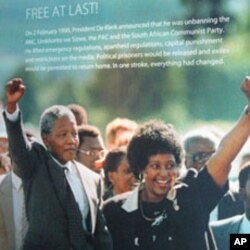South Africans Thursday celebrated the release from prison 20 years ago of former President Nelson Mandela. For many the event signaled the beginning of the end of apartheid.
Thousands of South Africans Thursday gathered outside the Groot Drakenstein prison near Cape Town to mark the first steps of freedom 20 years ago of anti-apartheid icon Nelson Mandela following 27 years in prison.
Mr. Mandela that day walked out with then-wife Winnie Madikizela-Mandela waving his fist in the air as organizers, who had been given a mere 24-hours notice of his release, struggled to contain the crowd.
A few hours later, Mr. Mandela delivered his first public speech in nearly three decades from a balcony at Cape Town's city hall to a massive crowd. "Your [South Africans'] tireless and heroic sacrifices have made it possible for me to be here today. I therefore place the remaining years of my life in your hands," he said.
His release had been announced nine days earlier by then-President F. W. De Klerk. Four years later Mr. Mandela would become South Africa's first democratically elected president.
The 91-year-old Mr. Mandela, who now moves about by wheelchair, did not appear at the ceremonies outside the prison. But many of his colleagues were there and spoke emotionally of its significance.
Cyril Ramaphosa, an activist and successful businessman, told the crowd that when Mr. Mandela was freed South Africans also knew that their freedom had arrived.
"But what should be clear is that you, the people of our country, freed Nelson Mandela. Mandela was not freed by De Klerk. He was freed by your struggle," he said.
Another veteran activist, Minister in the Presidency Trevor Manuel, said Mr. Mandela's release was symbolic of something much larger.
"We remind ourselves of where we come from in the struggle to establish a deep and durable democracy in this country that touches the lives of all of our people. We remind ourselves of where we come from but we remind ourselves also of where we need to go to," he said.
South African leaders note that in the 16 years since the end of apartheid, the government has created two million jobs, built more than one million low-cost homes and pursued pro-business policies that have created an emerging black middle class.
But they also note that the unemployment rate is 24 percent, millions of people still live in informal settlements without basic services and the country has one of largest gaps between rich and poor in the world.
And they lament most what they see as rising corruption and cronyism in government.
As a result, some South Africans have called for their leaders to recapture the spirit of sacrifice and public-interest that flourished following Mr. Mandela's release.




